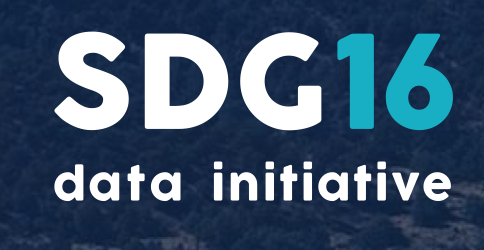At a side event to the 2016 session of the High-level Political Forum on Sustainable Development (HLPF), a group of stakeholders launched the Sustainable Development Goal (SDG) 16 Data Initiative, which will compile and publish statistical indicators for SDG 16 (Promote peaceful and inclusive societies for sustainable development, provide access to justice for all and build effective, accountable and inclusive institutions at all levels).
The initiative aims to complement the work of the UN Inter-agency and Expert Group on SDG Indicators (IAEG-SDGs) to develop an official indicator framework for monitoring the SDGs.
 14 July 2016: At a side event to the 2016 session of the High-level Political Forum on Sustainable Development (HLPF), a group of stakeholders launched the Sustainable Development Goal (SDG) 16 Data Initiative, which will compile and publish statistical indicators for SDG 16 (Promote peaceful and inclusive societies for sustainable development, provide access to justice for all and build effective, accountable and inclusive institutions at all levels). The initiative aims to complement the work of the UN Inter-agency and Expert Group on SDG Indicators (IAEG-SDGs) to develop an official indicator framework for monitoring the SDGs.
14 July 2016: At a side event to the 2016 session of the High-level Political Forum on Sustainable Development (HLPF), a group of stakeholders launched the Sustainable Development Goal (SDG) 16 Data Initiative, which will compile and publish statistical indicators for SDG 16 (Promote peaceful and inclusive societies for sustainable development, provide access to justice for all and build effective, accountable and inclusive institutions at all levels). The initiative aims to complement the work of the UN Inter-agency and Expert Group on SDG Indicators (IAEG-SDGs) to develop an official indicator framework for monitoring the SDGs.
The SDG 16 Data Initiative: pulls together datasets in an open format to track SDG 16, provide a snapshot of the current situation and assess progress over time; includes both global and complementary indicators, presented with official and unofficial data; and seeks to identify potential challenges in data quality, availability and coverage that need to be addressed.
The launch event took place on 14 July 2016, at UN Headquarters in New York, US. It was organized by the International Institute for Democracy and Electoral Assistance (International IDEA), the Institute for Economics and Peace (IEP), the Global Forum for Media Development (GFMD), Namati, the Open Society Foundations (OSF), Peace Research Institute Oslo (PRIO), Saferworld, Results for Development (R4D), Small Arms Survey (SAS), the Sustainable Development Solutions Network (SDSN), the Transparency, Accountability and Participation (TAP) Network, Transparency International, and World Justice Project.
Nathaniel Heller, R4D, said the SDG 16 Data Initiative bridges the difference between citizen-generated data and official data. He noted the need to reimagine national statistical offices (NSOs) as “data market-makers” instead of data producers in the future. Lisa Bersales, Head of the Philippines Statistics Authority (PSA) and IAEG-SDGs co-chair, noted that the IAEG-SDGs is currently finalizing its work on the three tiers in which the SDG indicators will be classified, and suggested that the SDG 16 Data Initiative can be useful for data disaggregation.
Paul Gulleik Larsen, Norway’s Ministry of Foreign Affairs, welcomed the SDG 16 Data initiative as a tool for compiling the wealth of SDGs-relevant data and making sense of it. He underscored the importance of SDG 16 for achieving the SDGs, noting that countries’ progress on SDG 16 could have a positive effect on their development cooperation relations.
In the ensuing discussion, participants addressed: interlinkages with other data initiatives; the need to capture the qualitative aspect of data; interlinkages between SDG 16 and other SDGs that should be captured by the initiative, such as the link between peace and poverty; and the need to invest in capacity building both for NSOs and civil society organizations (CSOs) that work on data collection.
The 2016 session of the HLPF is taking place in New York, US, from 11-20 July. [IISD RS Sources] [SDG 16 Data Initiative] [HLPF Website] [IISD RS Coverage of HLPF]